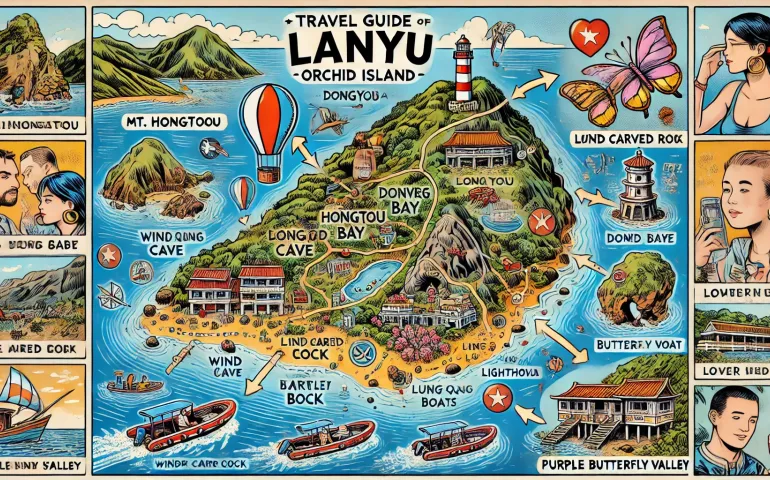About Place
- "A place where time slows down" : The island’s untouched natural beauty and traditional Tao culture create a serene environment where visitors can escape the fast pace of modern life.
- "A hidden gem in the Pacific" : Lanyu's isolated location and limited accessibility make it a pristine, off-the-beaten-path destination.
- "An island of cultural immersion" : Visitors often rave about the opportunity to engage with the Tao (Yami) people, one of Taiwan’s indigenous groups, and their unique customs and way of life.
Reasons to Visit
- Cultural Immersion : Lanyu is home to the Tao people, an indigenous group with a rich maritime culture. Their traditional way of life, including boat-building and fishing techniques, has remained largely unchanged for centuries. Visitors can experience this culture firsthand by participating in local festivals, visiting traditional underground houses, and learning about the Tao’s spiritual beliefs.
- Stunning Natural Landscapes : The island's volcanic origins have blessed it with dramatic cliffs, lush forests, and coral-rich waters. Lanyu’s landscapes are untouched by overdevelopment, making it a paradise for nature lovers. The island's pristine beaches, crystal-clear waters, and rugged terrain are perfect for activities like snorkeling, diving, hiking, and bird watching.
- Biodiversity : Lanyu boasts a unique ecosystem, with rare plant species, vibrant coral reefs, and diverse marine life. The island’s isolation has allowed endemic species to thrive, making it a valuable destination for ecotourism. Bird enthusiasts, in particular, visit to see species like the Lanyu scops owl, which is native to the island.
Visa
- Taiwanese Nationals : No visa is required to visit Lanyu.
- Visitors from Most Countries : Lanyu is part of Taiwan, so visa requirements to enter Taiwan apply. Many nationalities, including those from the U.S., Canada, the EU, and Australia, can enter Taiwan visa-free for up to 90 days.
- Visitors from Southeast Asia : Some countries have visa exemptions or require an eVisa to enter Taiwan. Check Taiwan’s visa policies for specific details.
- China : Mainland Chinese visitors need a special entry permit to visit Taiwan, including Lanyu.
Travel Expenses
- Travel to & from Destination : Flights from Taipei to Lanyu via Taitung typically cost around $200–$250 USD per person round-trip.
- Hotel Cost : Average accommodation costs around $50–$100 per night, depending on the type of stay (e.g., guesthouse, homestay, or small hotel). For a 2-person stay over 2 nights, the total would be approximately $200–$400.
- Food Cost : Daily meals, including lunch and dinner, cost around $10–$20 per person per meal. For 3 days, the total food cost for 2 people would be approximately $120–$240.
- Activity Cost : Guided tours, snorkeling, and other activities might cost around $50–$100 per day per person. For 2 people, the total activity cost for 3 days would be approximately $300–$600.
- Near Destination Travel Cost : Renting a scooter for transportation around the island is common and costs around $15 per day. For 3 days, the cost would be approximately $45.
Estimated Total Cost for a Couple : Approximately $865–$1,535 USD, depending on specific choices and activities.

Best Itinerary
Day 1 : Arrival and Cultural Introduction Upon arrival on Lanyu, start your day with a visit to the Tao Cultural Center, where you can learn about the island’s indigenous culture. Explore the traditional underground houses, built to withstand the harsh weather conditions. For lunch, head to a local eatery and try flying fish, a staple in Tao cuisine. After lunch, take a scenic drive around the island, stopping at the picturesque Lover’s Cave and the Wind Carved Rock formations. In the evening, enjoy fresh seafood at a restaurant overlooking the ocean, such as Lanyu Fish Market. End the day with a peaceful walk along the beach under the starry night sky.
Day 2 : Nature and Adventure Start your day early with a guided hike to the top of Mt. Hongtou, Lanyu’s highest peak. The trek offers breathtaking views of the island and surrounding ocean. After the hike, cool off with a snorkeling session in the clear waters of Dongqing Bay, known for its vibrant coral reefs. For lunch, visit a local café and try millet mochi, a traditional Tao snack. Spend the afternoon exploring the island’s coastline by scooter, stopping at Yeyou Village to see the traditional tatala boats. For dinner, enjoy a traditional Tao meal at a homestay, where you can interact with local families and learn more about their way of life.
Day 3 : Exploration and Departure On your final day, visit the Lanyu Lighthouse in the morning, one of the island’s most iconic landmarks offering panoramic views. Afterward, explore the island’s lesser-known beaches, such as Purple Butterfly Valley, where you might catch a glimpse of the island’s namesake butterflies. For lunch, try pina banana dishes at a local eatery. In the afternoon, visit the island’s hot springs for a relaxing soak before departing. If time allows, stop by the local markets to pick up handmade Tao crafts as souvenirs. Conclude your day with a scenic ferry or flight back to Taiwan's main island.

Safety Tips
- Respect local customs and traditions, especially when visiting Tao communities.
- Stay hydrated and protect yourself from the sun, as Lanyu can get very hot and humid.
- Wear appropriate footwear for hiking and exploring rugged terrain.
- Be cautious when swimming or snorkeling; currents can be strong in some areas.
- Keep an eye on weather forecasts, as the island is prone to typhoons.
- Use eco-friendly products to protect the island’s fragile ecosystem.
- Be mindful of wildlife and avoid disturbing the natural environment.
- Always carry a map or GPS device, as mobile reception can be limited.
- Drive carefully, especially when renting scooters, as roads can be narrow and winding.
- In case of an emergency, know the location of the nearest health clinic or hospital.
Flights
- UNI Air and Daily Air operate flights from Taipei to Lanyu via Taitung. The flight takes about 2.5 hours in total. Prices range from $200 to $250 USD.
Hotels
- Jikara Homestay : Known for its traditional Tao-style hospitality.
- Lanyu Blue Sea Inn : Offers stunning ocean views and modern amenities.
- Xiang Ting Homestay : A budget-friendly option with a local touch.
- Hounlang Ocean Hotel : Provides comfortable rooms with easy beach access.
- Big Fish Bay B&B : Located near popular snorkeling spots and offers a cozy stay.
Contacts
- Nearest Indian Embassy (Taipei) : +886-2-2778-2288
- Local Police : 110
- Ambulance and Firefighters : 119
Country
Closet Airport
- Lanyu Airport
Nearest City
- Taitung
- Taiwan
Heritage Sites
- Lanyu Tao Culture is recognized as a cultural heritage
Airlines
- UNI Air
- Daily Air
Currency
- New Taiwan Dollar (TWD)
Languages Spoken
- Mandarin Chinese
- Tao (Yami)
Real Story
A Major Historical Event in Lanyu : In the 1970s, the island became a focal point of controversy when the Taiwanese government established a nuclear waste storage facility on Lanyu without consulting the Tao people. The facility, which housed radioactive waste from Taiwan's nuclear power plants, was built under the guise of an economic development project, promising the Tao community jobs and infrastructure. However, the environmental and health risks posed by the waste were not disclosed to the locals.
Over the years, the presence of the nuclear facility has led to protests and legal battles as the Tao people demand the removal of the waste. This struggle symbolizes the broader issues of indigenous rights and environmental justice in Taiwan. The conflict over the nuclear waste has brought international attention to Lanyu, highlighting the tension between modernization and the preservation of indigenous lands and cultures.
Despite promises from the government to relocate the waste, it remains a contentious issue to this day. The ongoing struggle has strengthened the Tao community's resolve to protect their island and culture, making it a powerful story of resistance and resilience.
Cuisine
Local Cuisine : Lanyu’s cuisine is deeply connected to its maritime culture, with flying fish being the most iconic dish. The fish is often grilled, smoked, or dried and is a staple in Tao feasts. Another local delicacy is millet mochi, a sticky, chewy snack made from glutinous millet, reflecting the Tao’s agricultural heritage. Additionally, pina banana, a variety of small, sweet bananas unique to the island, is commonly used in desserts and snacks. Meals are typically simple but flavorful, emphasizing fresh ingredients sourced from the island’s land and sea.

Culture and History
Culture of Lanyu : Lanyu, or Orchid Island, is steeped in the rich traditions of the Tao (Yami) people, an Austronesian ethnic group with deep roots in maritime culture. The Tao's connection to the sea is central to their identity, reflected in their traditional tatala boats, intricately crafted and symbolizing community strength. The island’s culture is a harmonious blend of ancient practices and spiritual beliefs, revolving around respect for nature and ancestral spirits. Festivals like the Flying Fish Festival, where the Tao honor the arrival of flying fish, are integral to preserving their cultural heritage.
The Tao people live in villages scattered across the island, often in unique underground houses designed to protect against the harsh weather. These dwellings are both functional and symbolic, representing the Tao’s deep understanding of and adaptation to their environment. Tao crafts, particularly their silverwork and textiles, are highly regarded, with patterns and motifs passed down through generations.
Despite modern influences, the Tao community strives to preserve their language, rituals, and way of life, making Lanyu a living museum of Austronesian culture. Visitors to Lanyu have the rare opportunity to witness a society where tradition remains the backbone of daily life, offering a glimpse into a way of life that is rapidly disappearing elsewhere.
